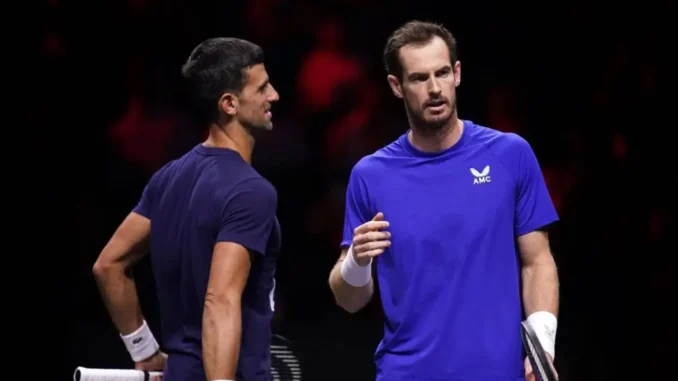
The notion of Andy Murray coaching Novak Djokovic has sparked widespread discussion and intrigue across the tennis world, with opinions ranging from skepticism to outright dismissal. The idea, as unconventional as it sounds, has been floated in hypothetical scenarios and discussed in tennis circles as both players navigate the latter stages of their storied careers. While it remains speculative, the very suggestion of Murray coaching Djokovic has led to questions about its feasibility, potential implications, and whether it reflects an attempt to rekindle a past era of dominance that no longer exists.
Andy Murray and Novak Djokovic are two names synonymous with the golden era of men’s tennis. Alongside Roger Federer and Rafael Nadal, they formed the “Big Four,” a group that dominated the sport for over a decade. While Djokovic, Nadal, and Federer amassed the lion’s share of Grand Slam titles, Murray carved his place as a relentless competitor, winning three major championships and two Olympic gold medals. His ability to challenge and occasionally best his peers earned him widespread respect and admiration.
In recent years, however, the trajectories of Murray and Djokovic have diverged significantly. Djokovic remains at the top of his game, continuing to add Grand Slam titles to his record-breaking tally and cementing his place as one of the greatest players in tennis history. Murray, on the other hand, has faced a more challenging path. A severe hip injury and subsequent surgeries have hampered his ability to consistently compete at the highest level. Though he continues to play and occasionally produces flashes of his former brilliance, Murray’s role in the sport has evolved into that of a seasoned veteran rather than a perennial contender.
The suggestion that Murray could coach Djokovic has raised eyebrows for multiple reasons. On the surface, the idea seems far-fetched; Djokovic, with his unparalleled success and formidable team, hardly appears to need coaching assistance from anyone, let alone a former rival. Additionally, Murray has shown no indications of stepping into a full-time coaching role, as he remains focused on his playing career. Yet, the hypothetical scenario has prompted a deeper exploration of what such a partnership could represent.
For Murray, the prospect of coaching Djokovic might seem like an opportunity to stay connected to the elite levels of the sport in a meaningful way. As a player who has faced Djokovic numerous times and understands his game intimately, Murray could theoretically provide insights and perspectives that even Djokovic’s current team may not offer. Their shared history, including some of the most memorable matches in recent tennis history, lends a unique dimension to their dynamic. However, skeptics argue that Murray stepping into a coaching role would be less about practical benefits and more about a nostalgic yearning to remain intertwined with the top echelons of tennis.
The phrase “an attempt to cling to something that no longer exists” encapsulates the sentiment that such a move might be more about rekindling the past than addressing the present. Murray’s role as a member of the Big Four was defined by his fierce rivalry with Djokovic, Nadal, and Federer, a rivalry that symbolized one of the richest periods in tennis history. To transition from rival to coach could be seen as an attempt to maintain a connection to that era, even as the landscape of the sport evolves.
For Djokovic, the idea of Murray as a coach may seem equally perplexing. Djokovic’s current team, led by long-time coach Goran Ivanišević, has been instrumental in his continued dominance. The Serbian star’s physical conditioning, mental resilience, and tactical acumen are already at an elite level, leaving little room for external input. While Murray’s understanding of Djokovic’s game could theoretically add value, it is difficult to envision Djokovic altering a winning formula to accommodate such a collaboration.
Critics of the hypothetical arrangement also point to the inherent challenges of transitioning from fierce competitor to coach. Murray and Djokovic’s relationship, while respectful, has been shaped by intense battles on the court, where each player fought tooth and nail for supremacy. Shifting that dynamic to a coach-player relationship could be fraught with complications, as the line between mutual respect and underlying rivalry might blur.
Beyond the practicalities, the discussion surrounding Murray coaching Djokovic speaks to a broader narrative about legacy and evolution in tennis. As the golden generation of players begins to wind down their careers, questions about how they will remain involved in the sport have become increasingly relevant. Federer’s transition to a role as an ambassador and Nadal’s potential post-playing career ventures are examples of how these legends may shape their legacies off the court. For Murray, whose playing career has been significantly impacted by injury, coaching could theoretically offer a way to stay engaged with the sport he loves, albeit in a different capacity.
Ultimately, the suggestion of Murray coaching Djokovic remains speculative at best and symbolic at most. It reflects the enduring fascination with the golden era of tennis and the desire to see its protagonists continue to contribute to the sport in new and unexpected ways. However, it also underscores the challenges of navigating the transition from player to coach, especially for individuals whose identities have been so deeply intertwined with their rivalries.
While the prospect of Murray coaching Djokovic may never materialize, it serves as a reminder of the deep connections and lasting impact these players have had on one another and on tennis as a whole. Their legacies, though distinct, are inextricably linked, and the hypothetical scenarios that arise from such connections highlight the sport’s rich history and ever-evolving narrative. Whether as players, coaches, or ambassadors, figures like Murray and Djokovic will continue to shape the story of tennis, even as the chapters of their own careers come to a close.
Leave a Reply